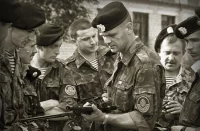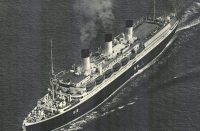The disaster that befell Great Britain’s legendary PQ 17 convoy, which was carrying military aid to the Soviet Union in July 1942, remains a mystery only to those who do not understand London’s true agenda during World War II.
The second front, which the Allies had promised Moscow in 1941, was not opened either in that year or the next. After all of Stalin’s diplomatic efforts and battles, assistance to the USSR came in the form of military supplies. The simplest and most efficient way to deliver that cargo was by sea. Polar convoys were assembled in Iceland and then sailed around Scandinavia to wind their way to Murmansk or Arkhangelsk. Each of them was guarded by British warships. The Germans attacked the polar convoys from airfields inside Nazi-occupied Norway. German submarines and surface vessels were based there, at military installations in Narvik and Trondheim.
Before July 1942 the convoys had experienced few casualties – the first occurred when convoy PQ 12 (March 1942, consisting of 12 merchant ships) lost one vessel and one destroyer escort. PQ 13 lost four vessels, PQ 14 – one vessel, PQ 15 – three vessels, and PQ 16 – seven merchant ships.
But out of the 34 merchant ships and tankers in the PQ 17 convoy, which set sail out of Hvalfjörður fjord on June 27, 1942, only 13 made it to the shores of the Soviet Union – 21 vessels were sunk! Out of the 297 airplanes included in that cargo, 210 went to the bottom of the sea, as did 430 of the 584 tanks, 3,530 of the 4,246 automobiles that were secured to the decks and stored in the holds, plus so much other military cargo that was so badly needed by the USSR, which was embroiled in fierce, heavy fighting on the Don and Volga. In all, 122,000 tons of cargo were lost out of the original total of 188,000 tons, in addition to the hundreds of human deaths …
But it was not these enormous losses that gave the PQ 17 convoy its own page in the history books – it was because of the reason why they happened. This reason had a human face. The fact is, the British warships … simply abandoned the convoy to the mercies of fate. They sailed away, ordering the convoy to scatter and for all its ships to make their own way to Soviet shores. Afterward, those defenseless vessels were easy prey for German submarines and aircraft …
The convoy’s military escort and covering forces consisted of six destroyers, four corvettes, four armed trawlers, three minesweepers, two submarines, and two anti-aircraft auxiliaries. Commander Jack Broome was in charge of the expedition and would later publish quite a remarkable memoir, Convoy Is to Scatter.
On July 3, 1942, after successfully fending off several German air attacks, the flagship of the escort received a coded cable from London, claiming that “photographs of Trondheim show that [German battleships] Tirpitz, Hipper, and 4 destroyers have left.”
On July 4, 1942, there were renewed German air attacks on the convoy. This time the Germans had much better luck: two ships were sunk and three damaged, but the Luftwaffe lost six planes. And then “something strange” happened. Early in the morning of July 5, Rear Admiral Hamilton gave his First Cruiser Squadron orders to retreat, withdrawing its protection from the convoy, and Admiral Pound, the Admiral of the Fleet, commanded the merchant ships to “scatter.” This decision was based on information that had allegedly been received regarding a threat of attack on the convoy from the battleship Tirpitz. It would be an understatement to say that Commander Jack Broome found this order to be utterly baffling and bewildering:
“The best descriptive parallel I could think of was an electric shock. The order to SCATTER is the prerogative of the senior man on the spot when, and only when, an overwhelming force attacks his convoy, which would be more difficult to massacre spread out than if it remained concentrated. It is the last straw, the ‘sauve qui peut’ and it is, of course, irrevocable … Upon obtaining these messages, separated by an interval of only 13 minutes and arriving with increasing urgency, we could draw only one conclusion. The Admiralty had received confirmation that the Germans were ready to strike, and these confirmations were sufficiently reliable for them to decide that, in the event of unrelenting attacks from above and below, defenseless merchant vessels would thus be safer than they would in the convoy … PQ 17 was the first convoy in the history of the Royal Navy to be ordered to scatter by an officer who was not on the spot.”
The official British story insists that the PQ 17 convoy was the victim of a tragic mistake. Supposedly, as soon as Lord Pound made his fateful decision and saw it through, it emerged that the German squadron had not gone anywhere and was still at its base in Norway!

But what really happened? Immediately after the treaty of alliance was signed with the USSR on May 26, 1942, British leaders, most likely Churchill himself, issued a secret order that the next convoy must not make it to the shores of the Soviet Union. All of Admiral Pound’s later actions, which are without parallel in naval and military history, are nothing more than his efforts to carry out the instructions he had been given. This not only made it possible to “help without helping” the Red Army, but also gave the British leadership a free hand to do their best to end the convoys altogether, on the pretext of having suffered “huge casualties.” This was a cutoff of assistance to the Soviet Union, right at a critical moment during the Battle of Stalingrad.
What’s more, because the British practically surrendered the convoy and handed over their sea route to the Nazis by withdrawing the protecting warships, this amounted to directly abetting Hitler’s continued surge toward Stalingrad to finish off Soviet Russia.
In order for the Führer to be made to see that his only way out was to crush the USSR, or in other words, to escalate the war, he needed irrefutable evidence that the British were prepared to betray Russia. And although they were officially allies, the British would be ready to make peace with the Reich if the USSR could be defeated. The British betrayal of their own convoy was proof offered to the Germans that this time a deal with them was possible.
The Germans really did know the names of each of the ships in the convoy and even the cargo each carried! The German submariners had no reason to hide. They surfaced and, not wasting their torpedoes, easily sank the defenseless merchant ships with artillery fire. The rescued Allied sailors later claimed that the Nazis were surprisingly well informed as to what each vessel was carrying. To explain this astonishing fact, the British later circulated the information that the Germans had allegedly found the code books and ship list aboard the merchant ship the SS Paulus Potter, which had been left adrift after having fallen under attack (the crew had abandoned the vessel but never scuttled it). Another oddity in the Germans’ behavior that was noticed by the eyewitnesses was their surprising nonchalance and confident sense of impunity. They did not seem to be fighting as much as … enjoying themselves, on a pleasant, innocent outing:
They were virtually handed a licence to bomb, torpedo, and photograph us, then shoot off home to photograph themselves putting on their medals! … Seldom can so much film footage have been taken of a single action at sea, all from an enemy standpoint, which reaped such a rich harvest in propaganda. (Paul Lund, PQ 17–Convoy to Hell)
One more curious detail: the radio cable ordering the convoy to retreat was sent by the British “in the clear,” in other words, without encryption! There is to this day still no rational explanation for why every basic rule of secrecy was suddenly violated. The only logical reason for sending a crucially important radio message in the clear when there was no pressing need to do so (!) would be that there was a desire for it to be immediately read by the enemy. The British openly informed the Germans that the convoy was now defenseless and could be easily attacked, but that there was no need to strike at the retreating cruisers and ships from the convoy that could fend for themselves. From that perspective it is immediately clear why the Germans behaved with such nonchalance and were so utterly confident of their impunity.
Another important fact: on July 5, 1942, the British warships received yet another radio cable, the meaning of which is difficult to interpret as anything other than a desire to cover their tracks: “Please note that the Admiralty’s message … to the ships escorting the PQ 17, to the commander of the 1st Cruiser Squadron and the Commander-in-Chief of the Home Fleet ordering the convoy to scatter was transmitted in naval encryption, and not in the clear, as was noted on the copies in circulation.” [Jack Broome. Convoy Is to Scatter]. In other words, the ship captains were asked to forge an entry in their ship’s log and to note that the telegraphed order “convoy is to scatter” was sent in encrypted form, rather than in the clear, as it actually was! Later, the Admiralty decided to destroy all the radio transmission logs from that campaign.
Is it not surprising that, after learning of the tragedy of convoy PQ 17, Stalin asked, “Do British naval officers even understand the concept of honor?”
The presented text was taken from the book by the Russian historian, writer and political activist Nikolay Starikov “Proxy Wars“, St.Petersburg, 2017. Adapted and translated by ORIENTAL REVIEW.
Reposts are welcomed with the reference to ORIENTAL REVIEW.
PREVIOUS EPISODES
Episode 17. Britain – Adolf Hitler’s star-crossed love
Episode 16. Who signed death sentence to France in 1940?
Episode 14. How Adolf Hitler turned to be a “defiant aggressor”
Episode 13. Why London presented Hitler with Vienna and Prague
Episode 12. Why did Britain and the United States have no desire to prevent WWII?
Episode 11. A Soviet Quarter Century (1930-1955)
Episode 10. Who Organised the Famine in the USSR in 1932-1933?
Episode 9. How the British “Liberated” Greece
Episode 7. Britain and France Planned to Assault Soviet Union in 1940
Episode 6. Leon Trotsky, Father of German Nazism
Episode 5. Who paid for World War II?
Episode 4. Who ignited First World War?
Episode 3. Assassination in Sarajevo
















Comments